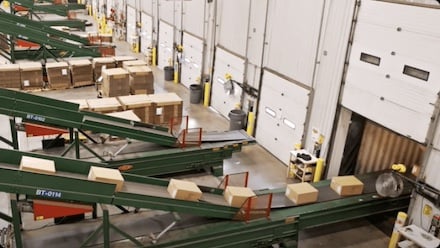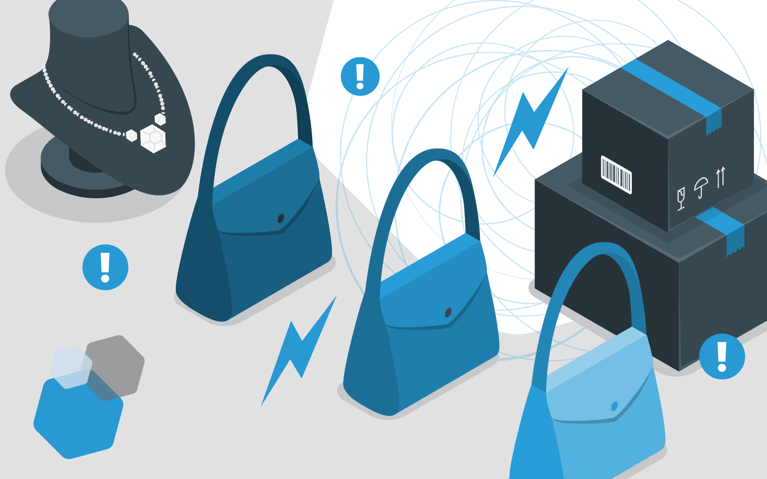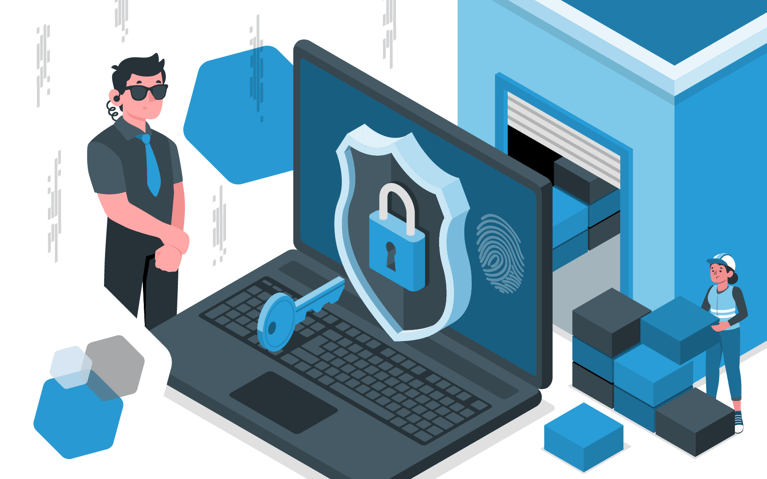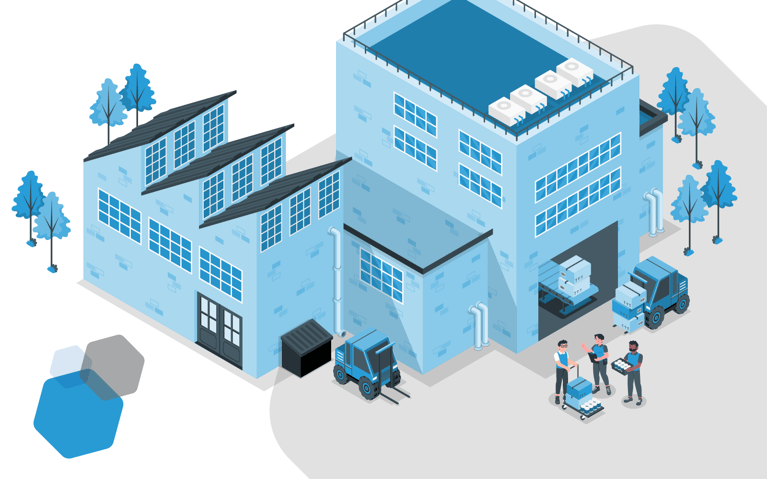When we think about the supply chain, everyday goods such as apparel, sporting goods, food, cosmetics, appliances, pet products and household items often come to mind. These industries strive for resilient, efficient supply chains that protect both products and sensitive customer information. However, several industries require specialized knowledge and heightened security beyond the norm. Logistics and supply chain providers in these sectors must adhere to stringent regulations and guidelines, demanding optimal security measures to ensure the integrity and safety of their products and data.
Ensuring a secure supply chain in complex industries requires implementing advanced tracking and monitoring systems, conducting thorough risk assessments and meeting regulatory compliance standards. Utilizing technologies like blockchain for transparent and tamper-proof records and AI for predictive analytics to identify potential disruptions further fortifies the supply chain. Supply chain providers must expect rigorous vetting and continuous monitoring of suppliers and partners to make sure all stakeholders meet the required security and safety protocols.
What industries are considered sensitive or complex?
Several industries require a secure supply chain due to the sensitivity of their products and the potential consequences of supply chain disruptions. These include:
- Government/public sector: Government agencies that handle products, items, gear and equipment used in defense, aerospace, military, transportation, utilities, office, health and safety verticals. Ensuring the integrity and security of these goods and materials is crucial for national security and safety.
- Pharmaceuticals: Ensuring the purity and efficacy of medications through rigorous supply chain security measures.
- Technology and electronics: Protecting intellectual property, avoiding counterfeit components and maintaining product integrity are essential in this highly competitive industry.
- Healthcare and medical devices: The safety of medical devices and supplies depend on a secure supply chain to prevent tampering, counterfeiting and contamination.
- Financial devices: The handling and distribution of sensitive financial documents and devices (e.g., ATMs, card readers) require ironclad security measures to prevent fraud and breaches.
- Energy and utilities: The security of the supply chain for critical infrastructure, including power plants and grid components, is vital to prevent disruptions and sabotage.
Each of these industries relies on a secure supply chain to maintain the integrity of their products, protect intellectual property and ensure customer safety and satisfaction.
Common vulnerabilities in the supply chain
In complex and sensitive industries, ensuring supply chain security is paramount to maintaining operational integrity and safety. Addressing vulnerabilities not only protects against disruptions but also builds resilience and agility, essential for adapting to unforeseen challenges. Common vulnerabilities, such as cybersecurity threats, physical security risks and regulatory non-compliance, can have significant repercussions if not properly managed. By understanding and mitigating these vulnerabilities, industries can safeguard their processes and enhance overall supply chain performance. Common areas of concern include:
Cybersecurity threats
According to Statista, in 2023, supply chain cyber attacks in the United States impacted 2769 entities. This is the highest reported number since 2017. In the last measured year, the number of affected entities has increased by approximately 58 percent year-over-year. For any industry affected, data breaches, ransomware attacks and phishing schemes present significant vulnerabilities.
Data breaches can expose sensitive information, jeopardizing privacy and national security. Ransomware attacks disrupt operations by locking critical systems and demanding hefty ransoms for restoration. Phishing and social engineering tactics manipulate employees into divulging confidential information or granting unauthorized access. The need for robust cybersecurity measures is critical, as it preserves privacy, ensures compliance with regulatory standards, builds trust with customers and stakeholders and prevents substantial financial losses. For example, a ransomware attack on a pharmaceutical company could halt production, delaying the delivery of essential medications and costing millions. Strengthening cybersecurity protocols, such as employee training, advanced encryption and regular system audits, is vital to safeguard the integrity and resilience of the supply chain in these high-stakes industries.
Physical security risks
Physical security risks significantly threaten operational integrity within the supply chain. Theft and pilferage can result in substantial financial losses and disrupt the timely delivery of critical components. For instance, the theft of valuable electronic parts in transit can delay production schedules. Vandalism and sabotage can compromise the quality and safety of products, as seen in cases where malicious individuals tamper with pharmaceutical shipments. In addition, natural disasters such as earthquakes, floods or hurricanes can devastate supply chain infrastructure, leading to prolonged disruptions and inventory shortages. Implementing robust physical security measures, such as surveillance systems, secure storage facilities and disaster preparedness plans, is crucial to mitigate these risks. A pharmaceutical company, for example, might invest in GPS tracking for high-value shipments to ensure continuous monitoring and immediate response to any irregularities.
Counterfeiting and fraud
Counterfeiting and fraud are pervasive vulnerabilities. The introduction of counterfeit products, such as fake pharmaceuticals or electronics, can have dire consequences for consumer safety and brand reputation. Document falsification, including the manipulation of shipping manifests and quality certificates, undermines trust and can lead to regulatory penalties. Supplier fraud, where unscrupulous vendors provide substandard or fake materials, poses a severe risk to the integrity of the supply chain. To combat these issues, implementing stringent verification processes, such as blockchain technology for transparent and immutable record-keeping, can be effective. For instance, a medical device manufacturer might use blockchain to ensure that every component meets regulatory standards and is traceable to its source. Regular audits and supplier vetting are also essential to detect and prevent fraudulent activities.
Regulatory non-compliance
Regulatory non-compliance is a critical vulnerability that can severely impact the supply chain in sensitive industries. Failure to meet industry standards can result in significant fines, legal repercussions and loss of market access. Inadequate documentation and reporting can lead to compliance gaps, making demonstrating adherence to regulatory requirements challenging. Delays in regulatory approvals due to incomplete or inaccurate submissions can stall product launches and disrupt supply chain timelines. For example, a biotechnology firm might face setbacks if it cannot promptly secure regulatory clearances for new drug ingredients. Meticulous documentation, regular compliance audits and proactive engagement with regulatory bodies are essential strategies to mitigate these risks. Leveraging technology solutions like compliance management software can streamline processes and ensure that all regulatory requirements are consistently met.
Supply chain disruptions
Supply chain disruptions are a persistent threat to streamlined operations. Transportation delays, whether due to logistical challenges or natural disasters, can impede the timely delivery of critical components. Supplier bankruptcies can abruptly halt the flow of essential materials, necessitating swift identification and onboarding of alternative suppliers. Geopolitical instability, such as trade wars or political unrest, can result in sudden regulatory changes or border closures, further complicating supply chain operations. To enhance resilience, companies must diversify their supplier base, establish contingency plans and maintain close communication with logistics partners. Investing in advanced supply chain management systems can provide real-time visibility and predictive analytics to proactively anticipate and respond to disruptions.
Strategies to strengthen and secure the supply chain
It is paramount for complex and sensitive industries to build a secure and resilient supply chain. From cybersecurity to physical security, counterfeiting prevention to regulatory compliance, companies must adopt a multifaceted approach to protect their logistics and fulfillment operations. Here are some high-level strategies to strengthen and secure the supply chain.
Implement robust cybersecurity measures
- Advanced encryption and secure communication protocols: Cybersecurity is a critical component in safeguarding the supply chain. Implementing advanced encryption and secure communication protocols ensures that data transmitted between parties is protected from interception and tampering. Encryption technologies, such as AES (Advanced Encryption Standard) and TLS (Transport Layer Security), provide robust protection for sensitive information.
- Regular vulnerability assessments and penetration testing: Regular vulnerability assessments and penetration testing help identify and mitigate potential security weaknesses. These proactive measures allow organizations to address vulnerabilities before they can be exploited by cybercriminals. Conducting these tests periodically ensures that the cybersecurity defenses remain robust and up-to-date.
- Cybersecurity best practices training: Educating employees on cybersecurity best practices is essential. Regular training sessions help employees recognize and respond to phishing attacks, social engineering and other cyber threats. By fostering a culture of cybersecurity awareness, organizations can significantly reduce the risk of cyber incidents.
Enhance physical security
- Use of surveillance systems and security personnel: Physical security is equally important as cybersecurity in protecting the supply chain. Installing surveillance systems and employing security personnel at key locations can deter theft, vandalism and sabotage. These measures provide continuous monitoring and quick response capabilities to potential security breaches.
- Secure storage facilities and transportation methods: Ensuring that storage facilities and transportation methods are secure is crucial. Implementing access controls, secure storage solutions and tamper-evident seals can protect products from unauthorized access and tampering. Using GPS tracking for shipments enhances security by providing real-time location data.
- Disaster recovery planning and infrastructure: Developing a robust disaster recovery plan is vital for maintaining operations during natural disasters. This includes infrastructure that can withstand adverse conditions, as well as strategies for quickly restoring services and minimizing downtime. Regularly updating and testing these plans ensures readiness for any eventuality.
Combat counterfeiting and fraud
- Authentication technologies (e.g., RFID, blockchain): Utilizing authentication technologies such as RFID (Radio Frequency Identification) and blockchain can significantly reduce counterfeiting and fraud. These technologies provide a transparent and immutable record of product origin and movement, ensuring authenticity and traceability throughout the supply chain.
- Supplier audits and verification processes: Conducting regular supplier audits and verification processes is essential for maintaining supply chain integrity. Verifying the credentials and quality standards of suppliers helps prevent the introduction of counterfeit products. Establishing strict verification criteria ensures that only reputable suppliers are part of the supply chain.
- Secure packaging and tamper-evident seals: Using secure packaging and tamper-evident seals can protect products from tampering and counterfeiting. These measures provide a clear indication if a product has been altered or compromised, ensuring that only genuine and intact products reach customers.
Meet regulatory compliance
- Regular updates to comply with changing regulations: Staying up-to-date with changing regulations is crucial for compliance. Regularly reviewing and updating policies to align with current regulations helps avoid legal issues and penalties. This proactive approach ensures continuous adherence to industry standards.
- Comprehensive documentation and record-keeping: Maintaining comprehensive documentation and record-keeping is essential for demonstrating compliance. Detailed records of processes, transactions and audits provide transparency and accountability. This documentation is critical during regulatory inspections and audits.
- Collaboration with regulatory bodies for audits and inspections: Collaborating with regulatory bodies helps ensure that compliance measures are current and meet industry standards. Engaging in regular audits and inspections with these bodies fosters a cooperative relationship and helps identify areas for improvement.
Build resilience against supply chain disruptions
- Diversification of suppliers and logistics partners: Diversifying suppliers and logistics partners reduces the risk of supply chain disruptions. By not relying on a single source, organizations can maintain continuity even if one supplier faces issues. This diversification strategy enhances overall supply chain resilience.
- Developing contingency plans and alternative routes: Developing contingency plans and alternative routes helps make sure that supply chain operations can continue during disruptions. These plans provide predefined responses to various scenarios, minimizing downtime and maintaining operational integrity.
- Real-time monitoring and predictive analytics for risk management: Utilizing real-time monitoring and predictive analytics helps identify and mitigate potential risks. These technologies provide insights into potential disruptions, allowing organizations to take proactive measures to prevent or minimize their impact.
Cart.com for a more secure supply chain
Cart.com delivers results for federal, state and local government agencies and other complex industries with advanced inventory distribution, logistics services and secure order management software. Our top-tier digital and physical security measures, including temperature-controlled facilities, ensure the protection of sensitive materials. Our proprietary software supports online ordering and provides comprehensive visibility into orders and inventory, meeting the stringent requirements of complex supply chains. Contact our experts today to find out more.
Subscribe to our emails for the latest industry insights!
By entering your email, you agree to receive marketing emails from Cart.com








